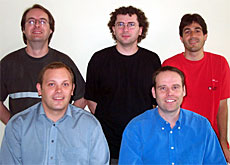Virtual machine software start-up eyes US market

Dunes Technologies SA, a young software firm in Lausanne, is poised to enter the United States market with its software targeted at information technology departments running a virtual machine platform.
The six-person strong company funded research and development for its innovative software products by selling, installing, and integrating VMware Inc’s sofware, which enabled the concept of virtual machines in the first place.
The “virtual machine” term refers to the practice of running several operating systems on a computer.
It is typically used inside large data centres, supporting multiple applications, one of which might run on WindowsXP, another on Windows98 and another on Linux.
Rather than buy one server for each operating system, IT managers buy one powerful computer and create several virtual computers on it, using VMWare.
In large organisations there might be several of these virtual machines supporting hundreds of different types of applications around the world.
Virtualisation of IT elements (servers, network, storage) is popular because it uses the resources of the data centre more efficiently, according to a recent report by Clipper Group, a technology consulting firm based in Wesley, Massachusetts.
Dunes has helped Swiss organisations, such as Bobst Group and Bedag Informatik AG, which runs the IT services for canton Vaud, to save money and resources by implementing a virtual machine platform.
Now that Microsoft, which has announced it is own suite of virtual machine software, and companies such as IBM and HP are promoting virtual machines, the technology is moving from the early adopter to wider market acceptance. Dunes Technologies is poised to capitalise on the trend.
Innovating in a new paradigm
Dunes was founded by four former employees of Lysis SA, a venture-backed start-up company, also from Lausanne, that developed one of the world’s first video-on-demand management suites.
In 1999 Lysis sent its head of business development, Stéphane Broquère, to Palo Alto to try to sign up some new customers, but it didn’t bargain on him moving in next door to the founder of VMware Inc.
At that time VMware was creating quite a buzz in Silicon Valley. It had attracted top-tier venture capital investors and lots of attention from the trade and financial papers.
Its software was sold originally to enable Windows or Linux PCs to run multiple Intel-based operating systems on top of it, and was used by software designers who had to make and test code to be run on various operating systems.
But what made it a technology star was its server line of products aimed at enabling users to run large numbers of operating systems on a single physical machine.
The concept was new and has come to be regarded as an important building block in making computing power a more flexible and easily managed pay-as-you-go utility.
Broquère saw all this up close and made a decision, along with three other Lysis engineers, to start their own company based on this vision of a new paradigm in computing and IT services.
They returned to Switzerland, and Dunes Technologies was founded in 2000 to create software that would make it easier to not just enable virtual machines, but to manage, monitor and optimise them.
Four months later Lysis was acquired by Kudelski SA.
Technology bubble
Dunes came into being just as the technology bubble burst. It never sought venture capital funding and probably would not have received any at that time even if it had tried, as the venture community suddenly stopped activities fearing they would be unable divest their holdings.
Now Broquère says he is happy that they did not get funding because many of the companies that started up then, the ones that would have been his competitors today, are no longer in business, or are struggling.
Dunes Technologies now has two products on the market: an older one that competes with VMware’s own management system, and a new one, used to align the usage of IT resources according to specific business activities, which is sparking demand from the US market.
“Our company is the only firm worldwide that makes policy management software for the management of virtual machines. We know we have something unique because demand is picking up from customers in the US where many of the huge data centres reside, and they are coming to us looking for a solution,” said Broquère.
He is also aware of the difficulty of being located in Switzerland when customers are dotted around the globe. His experience working at Logitech prior to Lysis taught him a thing or two about building an international market for Swiss innovation.
The firm’s success will depend on finding good partners who are able to promote and sell its software in the high-growth markets.
“We are seeking partners in other countries to act as value-added resellers. The vendor has to be local and understand the local markets,” said Broquère.
Having weathered the worst three years to hit the technology sector ever, Dunes Technologies has proven it has survivor skills. Now it will have to manage the opposite, managing rapid market demand and fast growth in an international marketplace.
by Valerie Thompson

In compliance with the JTI standards
More: SWI swissinfo.ch certified by the Journalism Trust Initiative
You can find an overview of ongoing debates with our journalists here . Please join us!
If you want to start a conversation about a topic raised in this article or want to report factual errors, email us at english@swissinfo.ch.